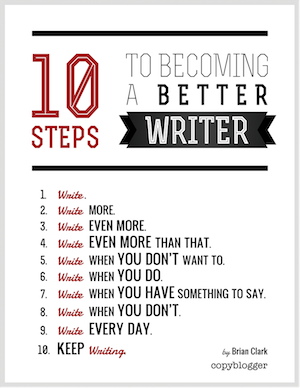
5 Harsh Truths About Building Your Writing Career
The madness has to stop.
It’s one thing to offer resources, services, and products to help writers succeed. I do it and without the help of blogs that teach writing, I wouldn’t have been able to build my own writing career.
Bullshitting people, however, isn’t okay.
I’m sad to see some of the nonsense that’s going on in the blogosphere — hyperbolic promises, well-intentioned yet bad advice, and flat out lies about what it takes to succeed.
The good news? As I’ve said many times before, we’re living in the best possible time in human history to be a writer.
Maybe (probably) you’ll never become a New York Times bestselling author, sell a million copies of your book, or be able to retire early off your writing income and live on a beach all day.
But you can have an audience of thousands of people who read your work. That’s pretty cool, right?
You can make a living with your writing — maybe not a lavish one, but isn’t being able to sit down and write every day and get paid good enough?
Even some of the loftier goals I mentioned above are possible, but I can’t tell you how to achieve them because I haven’t done them.
I made the unsexy decision to give tips and strategies that are, you know, grounded in reality. I could make more money by creating $3,000 courses on “making six-figures in six months” but it’s just not my style.
If you want to know the truth about building your writing career so you can actually succeed, read on.
And remember, the advice is good, but the hustle is sold separately.
Luck Plays a Large Role in Your Success
Wait, didn’t I just say if you take the right steps, you can find success with your writing?
Yes, but many elements of becoming a successful writer are purely based on chance.
In fact, much of the wild success you see in life is random. Nassim Taleb, the author of Fooled by Randomness, says it well in a section of the book:
“Hard work will get you a professorship or a BMW. You need both work and luck for a Booker, a Nobel or a private jet.”
Some writers go viral early in their career and it sets them up for success in the future.
Traditional publishers — who have a horrible track record identifying best sellers — publish thousands of books in the hopes a few will pay for the rest of the flops. In fact, that’s exactly what happens.
This is why you should be careful when someone makes it big tells you to follow their exact steps to get the exact same results. When people get successful, they smooth out the randomness, luck, and advantages that influenced their success out of the story.
They might not be lying, per se, either. We tend to create a narrative around the steps we took in our lives to get where we are today. We omit the parts that don’t ‘fit’ and what’s left is our ‘memory.’
So why shouldn’t you just abandon this article right now? Doesn’t this rule apply to what I’m saying?
While wild success is unpredictable, lower degrees of success are predictable.
There are tried and true blueprints for:
- Getting your first 1,000 subscribers
- Getting your first 10,000 subscribers
- Publishing your work on popular websites
- Creating compelling work with the elements of virality (you just can’t guarantee the results)
- Validating book ideas with a chance to sell
And much more…
And while all of these blueprints work, they have to be done on a long enough timescale. Which leads me to my next point.
Success Will Take Longer than You Think
Hofstadter’s law says the outcome you want to achieve will take longer than you expect, even when you account for that up front.
Jon Morrow, a millionaire blogger and master writer who I learned much of what I know from, once said it will take “four to six years” to build a blog that earns in the six-figures annually.
I bet that discouraged most writers who read that. Fortunately for me, it wasn’t. I’m lucky.
Writing clicked for me right away. Even when I wasn’t good at it, the thought of writing for years seemed exciting to me because I love to write.
Some writers do very well in a much shorter time frame. To understand why re-read the first point.
The four to six-year time frame makes sense when you think about it. If you want to be a successful writer, you should treat your writing as a business.
Nobody bats an eye at the idea of a traditional business taking four to six years to get traction.
Why should it be any different for writing? It’s not.
If you want to be a writer and an entrepreneur, you’re going to experience the same problem an entrepreneur faces.
Nobody knows who you are…
You will try things that don’t work and it won’t feel good…
There’s a lot of competition…
There’s an easy way to overcome the last point, though. If you want to beat out the competition, just keep trying longer than everyone else.
The Reality
While it’ll take a while to have the type of success you really, really, really want, you don’t have to go penniless and publish work no one reads for an infinite amount of time.
You get traction and pass milestones along the way.
Even in the early stages, you can make some money, but you have to do the work.
Why not just pay the price up front? Decide now. Understand it’s not going to be smooth sailing at first so it doesn’t surprise you when you face inevitable setbacks.
Your Friends and Family Will Think You’re Crazy
Do yourself a favor. Don’t tell your family and friends you plan on becoming a full-time writer.
Unless they’re really supportive, they’ll either flat out tell you it won’t work or they’ll ‘concern troll’ you.
Concern trolling happens when people undermine your success and mask it as concern. They can’t even control it. It’s a deep subconscious thing.
Also, if your friends and family think you’re crazy, they’re right.
There’s a reason why most people don’t get to sit in their underpants and write all day. It’s hard. There’s a reason why everyone isn’t an entrepreneur. It’s hard.
The hard thing about hard things is…they’re hard.
Your writing career is your evil plan.
You have to be like Dexter from Dexter’s Laboratory and work on your insane little projects in your basement.
Tell your friends and family it’s a hobby. Keep the dream to yourself and do the work.
Writing Isn’t a Great Way to Make Money
In comparison to all other means of making money…
I can think of hundreds of better business models than making a full-time living writing, but I chose writing for a living because I love it.
If you want to do this writing thing, you have to love it.
You can’t want to write to get rich and then get rich writing. If that’s your main reason for starting, you should quit right now. I’m serious. It’s not going to work.
It seems like I’m being harsh and negative, doesn’t it?
I’m just trying to counter-balance some of the crazy promises I’m seeing these days. I don’t want you to see dollar signs and end up heartbroken.
Write because you love to write.
You need to build the habit first. When you build the habit, you’re more competent. When you’re more competent, you’re more passionate. The more passion you have, the more attractive you make your writing.
When you wield attractive words, people will start to notice you.
Then, and only then, can you start thinking about making the big bucks.
Like I stated earlier, there are many means to earning money in the short term. You don’t have to starve. But, hold off on the six-figure talk for a little bit, eh?
You Probably Suck at Writing (for Now)
I’m looking at the first blog post I published. Awful.
I can’t even bring myself to read my first book. I literally can’t open it. I cringe.
A few years from now, I’ll cringe at this post.
Seth Godin put it best:
Writer’s block isn’t hard to cure.
Just write poorly. Continue to write poorly, in public, until you can write better.
Writing more will solve most of your problems.
You’re frustrated because you’re not very good. You won’t get good until you write more.
No one wants to read your writing right now because it isn’t good. Write more.
If you’re a novice writer and you’re focused on anything else but…writing…
…you’re misguided and need to write more.
If this hasn’t sunk in yet, take a look at this lovely infographic:

Source: Copyblogger
Why I’m Bullish On Writing Despite Everything I Just Said
In spite of everything I said in this post, I’m excited for not only my career, but the careers of those who put in the work, practice in public, and focus on gaining momentum.
There are no barriers to your success, except for you. We all get a fair shake at this writing thing now…
No more having to send query letters to publishers who never reply.
No more waiting to be picked by a gatekeeper.
With the advent of blogging, self-publishing, patronage, and many different avenues, you can build a writing career from scratch with no one’s permission.
And, unless you have zero talent (which I doubt is true), you can expect a reasonable amount of success.
In a single day, I worked with a client I gained from writing, published a paid freelance post, checked my book royalties dashboard to see I’ve made some sales, watched an affiliate commission come in.
I’m not a six-figure blogger yet, but I get to write every day and do what I want.
You can have the same future, but it will stay a vision of the future unless you do the work today, and the next day, and the next.